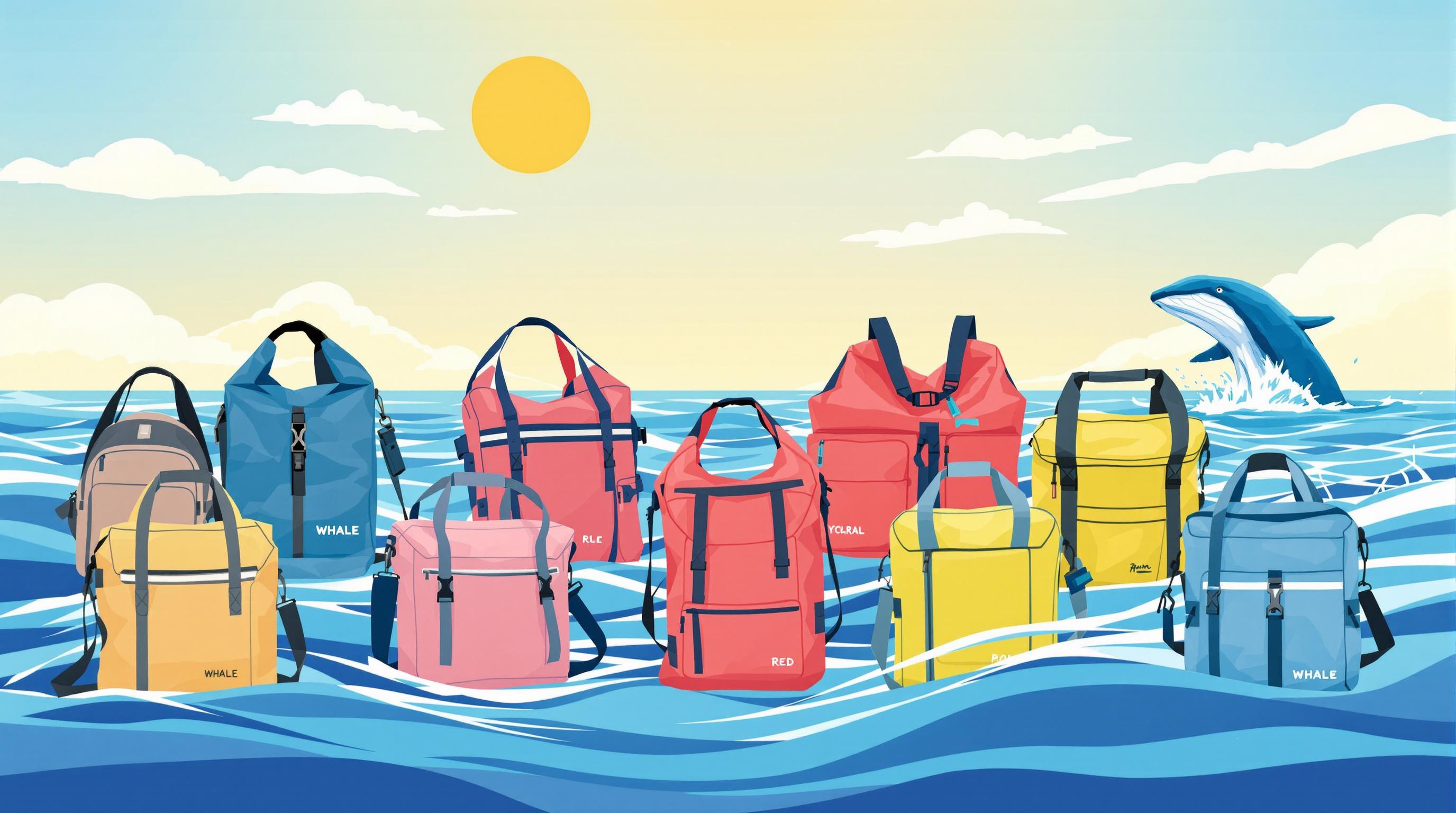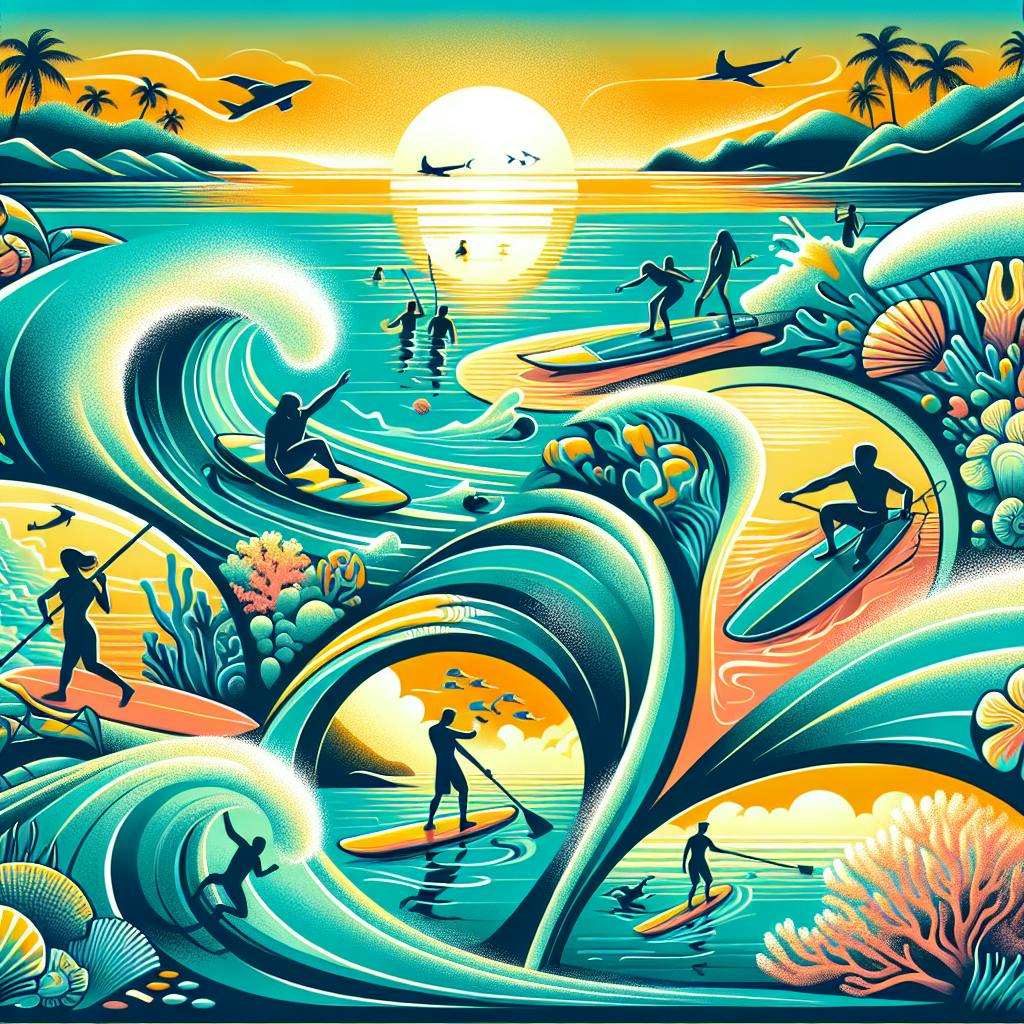Planning a family fishing tour? Here's what you need to know:
- Duration: Half-day (4-6 hours) or full-day (10 hours) options
- Location: Inshore for beginners, deep-sea for more adventure
- Gear: Most tours provide rods, reels, bait, and life jackets
- Safety: Wear life jackets, apply sunscreen, follow crew instructions
- Kid-Friendly: Special gear and activities for children
- Learning: Opportunities to discover marine life and conservation
Key tips:
- Pack essentials: sunscreen, snacks, water, and proper clothing
- Check weather and fishing seasons before booking
- Bring required licenses and permits
- Focus on fun, not just catching fish
Related video from YouTube
Getting Ready for Your Trip
Planning a family fishing tour? Here's what you need to know to make it safe and fun for everyone:
What to Pack
Don't forget these essentials:
- Clothes: Layer up, including a windbreaker. Pack long-sleeved shirts and non-skid shoes.
- Sun Gear: Sunscreen, sunglasses, and hats are a must.
- Fishing Stuff: Check if you need to bring rods and reels. Lightweight ones are great for kids.
- Safety First: Bring life jackets and a small first aid kit.
- Comfort Items: Pack seasickness meds, snacks, and water. A cooler is handy.
- Papers: Keep licenses and IDs in a waterproof bag.
Best Times to Go
Timing can make or break your trip:
Spring's great - fish are active after winter. Summer's warm and calm - perfect for families.
Fish act differently each season. In spring, they like insect-like bait. In summer, they go for small fish.
Always check the weather. Clear skies and calm seas make fishing WAY more fun, especially for kids.
"There's no better season to plan a fishing charter than summer." - Captain Smiley Fishing Charters LLC
Summer's awesome for families. Longer days mean more time for fishing and exploring.
Required Papers
Don't forget these important documents:
- Fishing Licenses: Adults usually need these. Check if kids need them too.
- Special Permits: You might need extra permits depending on where you're fishing and what you're catching.
- ID: Bring ID for all the adults.
"A valid Pennsylvania fishing license is required of persons age 16 and over." - Fish and Boat Commission of Pennsylvania
Pro tip: Buy your licenses and permits early. You can usually get them online or from local shops.
Tour Details
Family fishing tours mix adventure with quality time. Here's what to expect:
How Long Tours Last
Fishing tours come in different lengths:
- Half-day trips: 4-6 hours, great for families with young kids or fishing newbies.
- Full-day trips: About 10 hours, for families wanting more time on the water.
Captain Larry, a pro fishing guide, says: "Charter fishing is best in the summer. However, here in Myrtle Beach, the weather is mild all year around and great for fishing."
Where You'll Fish
Your fishing spots depend on your location and target fish:
- Inshore fishing: Calmer waters, easier access. Perfect for families with young kids.
- Deep-sea fishing: For bigger catches, like in Destin, Florida - "The World's Luckiest Fishing Village."
In Destin, you might fish in the Gulf of Mexico or Choctawhatchee Bay. The area has over 50 types of sport fish, including tuna, mackerel, mahi-mahi, snapper, grouper, and triggerfish.
Fishing Gear and Help
Most family-friendly tours provide everything you need:
- Rods and reels for all ages
- Bait and tackle
- Life jackets (including kid sizes)
Expert guides will help you:
- Bait hooks
- Show you how to fish
- Land your catch
Don't be shy about asking for help! One charter service says: "Listen to your captain and deckhand and don't be afraid to ask questions! It may be a different method than what you've learned, but 99.99% of the time they know more than you do."
Safety Rules
You'll get a safety briefing before you start. It usually covers:
- How to use life jackets
- How to move around the boat safely
- What to do in an emergency
Pay attention to these instructions. One charter operator says: "The Captain will announce himself to the passengers. Pay attention, as you'll receive important information to ensure both your safety and enjoyment."
Safety comes first. Always wear your life jacket, do what the crew tells you, and keep an eye on your kids.
sbb-itb-735af6e
Things for Kids
Family fishing tours aren't just for grown-ups - they're packed with fun for kids too. Here's what makes these trips a hit with the little ones:
Kids' Fishing Gear
The right gear can make or break a kid's fishing experience. Here's what you need to know:
For kids 8 and up, the Zebco Roam is a top choice. It's got a push-button reel and a 6-foot rod that's easy to handle. Plus, it comes ready to use with a 10-lb line and a comfy grip.
Younger kids might like the Ugly Stik Dock Runner. It's shorter at 3 feet, perfect for little arms. The spinning reel might take some getting used to, though.
Quick tip: Think about swapping out the line that comes with most kids' fishing kits. The included lines often tangle or break easily, which can be a real mood-killer for young fishers.
Fun for Every Age
Fishing tours offer more than just catching fish. Here's how kids of all ages can have a blast:
Little ones (toddlers and preschoolers) do well with short trips and simple poles. The Kid Casters Youth Fishing Pole is a good bet - its design helps prevent tangles.
Elementary-age kids can enjoy programs like those offered by Wilderness Adventures. These might include fly fishing lessons, outdoor cooking, and even swimming breaks.
Older kids and teens can try more advanced fishing techniques. Some tours, like Wilderness Adventures' Jackson Hole trip, even include fishing competitions.
Don't forget - fishing is just part of the fun. Encourage kids to explore, look for bugs, or spot wildlife between casts.
Teaching Time
Fishing tours are great for learning about marine life and conservation. Here's how to make the most of it:
1. Before the trip:
Take your kid to a local tackle store. Let them pick out some gear and learn about different fish. It'll get them excited and ready to learn more.
2. On the water:
Encourage kids to:
- Spot different types of fish
- Learn where fish live and how they behave
- Understand why catch-and-release is important
3. Keep it fun:
Kevin VanDam, a champion fisher, says: "Action and movement are important to kids. Start out by fishing from the dock where they'll have room to move." This keeps kids engaged and learning.
4. Go with the flow:
Shelley Perry, another pro fisher, advises: "Don't force it on them. Most often, kids left to fish at their own pace are the most successful." Let their curiosity lead the way.
Life on the Boat
Family fishing tours are about more than just catching fish - they're about making memories on the water. Here's what to expect during your trip:
Staff Help
The crew isn't just there to drive the boat and bait hooks. They're your guides to the fishing world.
Sean, an author and fishing enthusiast, says: "Getting to know your captain and first mate will have a tremendous impact on what you get from your trip."
To get the most out of your experience:
- Show up 15 minutes early to meet the crew
- Ask about fishing techniques and gear
- Speak up if you want to try different spots or methods
A friendly attitude goes a long way. The crew's know-how and stories can turn a good trip into an amazing adventure.
Boat Features
Comfort matters on family fishing tours. Most boats have:
- Places to sit and rest
- Bathrooms (called "heads" on boats)
- Shaded areas
- Storage for your stuff
Pro tip: Ask the crew where to keep your gear dry. Things get wet and slimy on fishing boats!
Longer trips might offer extras like fridges, kitchens, or even bedrooms. When booking, ask about specific features if they're important to your family.
Food and Drinks
Staying fed and hydrated is key for a fun day on the water. Here's the scoop:
- Many charters provide basic snacks and drinks
- Some offer full catering (check when booking)
- You can often bring your own food and drinks
Important: Always check the food and drink rules before your trip. Some boats have limits on what you can bring.
Don't forget a cooler. Use it for:
- Food you bring
- Keeping drinks cold
- Storing fish you catch
Fishing trips often start early (around 6 a.m.) to catch the best runs. Pack enough food and water for everyone.
Louisiana Charter Fishing says: "Your captain and crew want you to have a fabulous trip, and their many years of experience have given them some amazing tales that they just might be willing to share."
So relax, enjoy the ride, and get ready for a day of fishing, learning, and family fun on the water!
Staying Safe
Safety comes first on family fishing tours. Let's dive into some key tips to keep everyone safe and happy on the water.
Life Jacket Rules
Life jackets aren't optional - they're a must. The U.S. Coast Guard says every person on board needs a Coast Guard-approved life jacket. Here's the scoop:
- Make sure it fits snugly. Kids need kid-sized jackets.
- Keep them on the whole time, not just when the boat's moving.
- Check your state's rules. Some say kids MUST wear jackets at all times.
"Life jackets save lives. Period. We've seen countless cases where people survived just because they had their jackets on." - BIS Safety Software
Sun Safety
The sun can be sneaky on the water. Its rays bounce off the surface, upping your burn risk. Here's how to outsmart it:
- Slather on water-resistant SPF 50 sunscreen. Put it on 20-30 minutes before you head out, and reapply every two hours or after a swim.
- Wear UPF 50 clothes. They block 98% of UV rays. Sun shirts are great backup.
- Find some shade. Make sure the boat has spots to duck out of direct sun.
Cora, who loves fishing, says: "There is nothing worse than a sunburn after a really fun day outside!"
Emergency Plans
Hope for the best, plan for the worst. Here's how to stay ready:
1. Pack a safety kit with:
- First aid stuff
- Flashlight
- Duct tape
- Whistle
- Fire extinguisher
2. Bring a way to call for help. A VHF radio or fully charged phone works.
3. Tell someone your plans. File a float plan with a friend or the Coast Guard.
4. Keep an eye on the weather. Be ready to head back if it turns nasty.
"Being ready for emergencies is key. Know how to prevent them, and how to handle them if they happen. That's how you make sure everyone gets back to shore safely." - Travelers Insurance
Wrap-Up
Family fishing trips mix fun, bonding, and learning. Here's what to keep in mind:
Stay Safe: Life jackets are a must. BIS Safety Software puts it simply: "Life jackets save lives. Period."
Manage Expectations: It's not all about the catch. Lenny Rudow from BoatUS Magazine says:
Worry less about catching fish and more about keeping that grin going from ear to ear.
Keep It Exciting: Pick spots with lots of fish action. Pack snacks, take breaks, and be ready to change plans. The Vermont Fish & Wildlife Department notes:
Fishing is a great way to make lasting memories with your children.
Get the Right Gear: Choose kid-friendly equipment. Light rods and reels help kids catch more. New to fishing? Borrow gear from friends who know their stuff.
Learn Together: Teach kids about sea life, conservation, and fishing tricks. Get them involved - let them organize tackle or spot wildlife.


